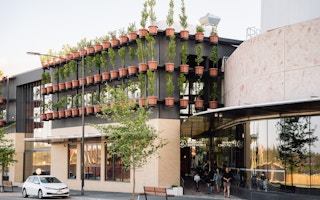Singapore multinational real estate firm Frasers Property has committed to be carbon neutral by 2050.
To continue reading, subscribe to Eco‑Business.
There's something for everyone. We offer a range of subscription plans.
- Access our stories and receive our Insights Weekly newsletter with the free EB Member plan.
- Unlock unlimited access to our content and archive with EB Circle.
- Publish your content with EB Premium.
The company, which made the announcement on Thursday (21 January) in its sustainability report, is the first publicly listed Singaporean real estate company to set a net-zero carbon emissions target for the first half of the century.
The firm, which also has operations in Australia, Thailand, Vietnam, and the United Kingdom, is to reduce emissions using a range of strategies, including increasing its use of renewable energy, tapping on energy-efficiency measures such as district cooling, and switching to low-carbon solutions such as LED and smart lighting.
The company stated that since the real estate industry is responsible for 39 per cent of energy-related carbon emissions globally, tackling climate change is its top sustainability priority.
Measurement and disclosure will come first. The company said that it will draw up net-zero carbon roadmaps and science-based carbon reduction targets across all of its businesses by 2022. Some of the company’s business units are expected to achieve net zero earlier than 2050, with the Burwood Brickworks shopping mall in Australia slated to be carbon neutral by 2028.
As well as set carbon reduction targets, Frasers plans to carry out scenario analysis to assess how its properties are likely to be affected by climate change. Risk assessments and adaption measures are to be drawn up by 2024, with reporting to be aligned with the Task Force on Climate-related Financial Disclosures.
The company aims to have all its owned and managed assets, as well as new projects under development, certified as green buildings by 2024.
It will also give all of its staff sustainability training this year, and extend the training to its supply chain and other stakeholders after this year.
Much of the Frasers Property’s sustainability strategy will be driven out of Australia, where sustainability head Paolo Bevilacqua is based. In Australia, some of the company’s most advanced carbon reduction ideas are being deployed, such as using geothermal energy and district cooling systems.
Frasers’ Australian operation runs an energy-as-a-service business, renting roof space from building owners to install and operate solar panels, batteries and biodiesel generators, and selling the energy generated to home owners and tenants. The company is planning to expand the business model into the industrial sector.
Frasers Property’s chief executive Panote Sirivadhanabhakdi said that to achieve the net zero target, the company plans to incorporate environmentally and socially sound practices throughout the value chain, including investment, design, and operations.
In November 2019, state investor Temasek became the first Singapore firm to make a carbon neutral pledge, and last year met its target. The company is aiming to half the emissions of its portfolio companies by 2030 and reduce them to net zero “sooner than later”.
The Singapore government announced a year ago that it would aim to be net zero some time in the second half of the century, a pledge that has not been followed by decarbonisation commitments from local firms until now.








